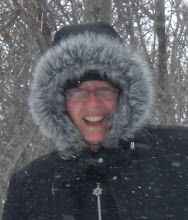Apparently, the bush of Alaska has more Search & Rescue incidents than the rest of the country combined. A guy comes to the school every year to talk to the kids about survival. The boys and I heard him, and he was full of survival tips and funny stories.
He told the kids to always carry a VHF radio with them (a kind of radio/walkie-talkie). The radios only have a 10-15 mile working radius, so the kids were taught what frequency the airplanes use that fly overhead. He said you can always get help if you get through to one of them.
Incidentally, a VHF radio is the one thing we don’t have—maybe next year. Around here, they are used like telephones, and they have multiple purposes. One day, someone got on the school frequency and called out for Keri, asking him to phone her dad. So Keri took down the number and called the guy. When the guy answered, he said, “Thanks! I couldn’t find my cell phone!” and then promptly hung up.
One safety tip the speaker passed on, is that while traveling over a frozen river, always carry a big stick, holding it sideways with both hands as you walk. That way, if you fall through the ice, it will stop you from going all the way under because it will hopefully be longer than the hole is wide, and you can pull yourself out. He’s done that for years. But when he actually fell through, it was such a shock that the first thing he did was throw the stick down so he could grab for the ice. That reflex reaction almost got him killed.
One time, search and rescue were out looking for a family that had disappeared. They were riding around on snowmobiles looking, and it was dark, so they all had their lights on. Well, a snowmobile went flying past, but they just figured it was one of the search party so they kept right on looking. Turns out later, that it was the people they were looking for. They were so frozen and disoriented that they hadn’t even seen the other snow machines. Fortunately, they made it into town (kind of bumped into it). But they couldn’t remember where they had come from, and the sled full of kids and one adult was still out there. So the search party went looking in the direction that the people had come from when they had whizzed by. They finally found the rest of the family, huddled in the sled under a tarp, half frozen. I’m still not sure what the rational was for disconnecting the sled. Maybe speed and gas consumption? Or maybe it was a frozen brain not quite working right.
He told of a friend of his who got caught in a terrible storm. He kept trying to find his way home, but just couldn’t. Finally, he was forced to stop and build a snow cave and just ride out the storm. He almost froze to death that night, but somehow managed to stay just warm enough to survive. The next morning, he heard noises outside his snow cave—an animal sniffing around. He listened carefully, and decided it was a dog—not a wolf or bear—so he carefully crawled out of his cave. He was shocked to see his own dog, but was even more shocked when his wife came walking up to see what all the barking was about. She said, “What are you doing out here?! I’ve got breakfast ready, and it’s getting cold.” The storm had been so bad that he’d spent the night in his own backyard without even realizing it.
Most high schools have “Don’t drink and drive” or “Say No to Drugs” assemblies. We have “How to survive the bush” speakers. I guess a frozen body is seen as being more problematic than a fried brain.
Subscribe to:
Post Comments (Atom)

No comments:
Post a Comment